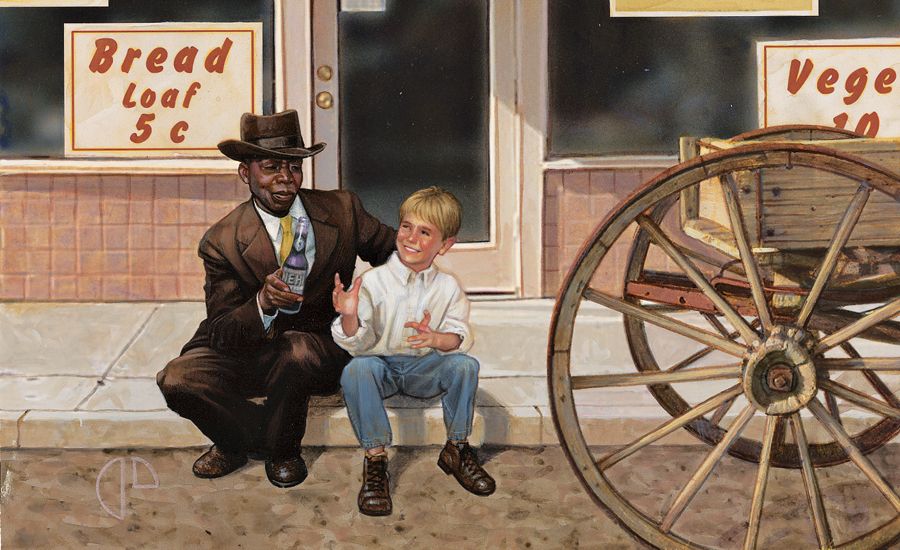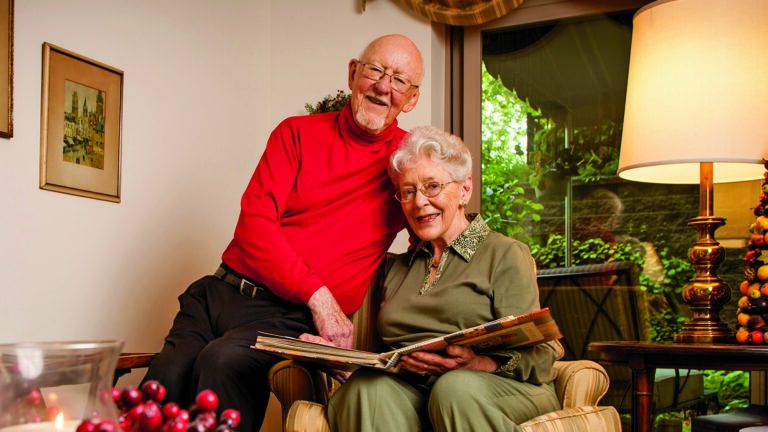Times were tough for my family that summer of 1928. My father was without work. But the morning sun was warm in our yard, and I pushed tin cans around in the dirt like trucks. What else could a nine-year-old do? Nothing that would make a difference, I figured.
My mother watched me from the front porch. Suddenly I heard: “Corn! Butter beans! Tomatoes!”
I jumped up and ran to the fence. An elderly black man in a broad-brimmed hat drove a mule cart loaded with vegetables. “Two cents an ear for corn!” he called out. “Four cents each tomatoes!”
“I’ll take some corn and three tomatoes, please,” my mother said. “You ask a decent price.” The man got down off his cart and gathered up the vegetables. He walked stiffly to the porch.
“Could I have a ride?” I blurted out.
“Sure enough,” the man said. “If your mama doesn’t mind.”
“I’d be thankful if it kept the boy busy for a while,” Mom said. She dropped some coins into his hand. He laughed and helped me into the wagon. “I’m King Brooks,” he said. “Let’s go, Maude.” The old mule started walking along.
Sitting up in that high wagon, I felt like a king myself. “I gotta get on with my work now,” said King when we got to the end of the street. “You run on home, you hear?”
“Can I ride with you again tomorrow?” I asked. “I could carry people’s groceries to them.”
King thought for a moment. “That would be a great help to me,” he said.
Next morning King picked me up at nine. We rode through the neighborhood. King called out prices and a lady called back her order. I gathered up fruits and vegetables from the back of the cart. My first customer!
“Thank you, young man,” she said when I handed her some butter beans and a watermelon.
I felt my face go hot. I looked down at the ground. “You’re welcome,” I mumbled. I turned and fled back to the cart. That was pretty much how it went all day.
In the afternoon King dropped me off back home with several ears of corn to give to my mother as payment. When I saw that corn on the dinner table that night my chest swelled with pride. I was making a difference.
I’d ride with King on Tuesdays, Thursdays and Saturdays. That first week I brought the customers’ money to King to make change. “Now, you watch,” he said to me. “This lady gave me 50 cents, and her order costs 39 cents. So that’s one penny plus two nickels she gets in return.”
I watched King closely—more closely than I’d ever paid attention to math in the fourth grade. By the end of the day I was making change myself.
“With you doing the leg work,” King said, “we’re doing twice as much business as usual.” That made me feel important, like a man instead of a child.
Now when a lady said, “Thank you, young man,” I looked her in the eye. “It’s a pleasure,” I’d reply.
King liked to tell stories as we rode along. “The Samaritans were considered real good-for-nothings,” King explained one day. “But when a man was hurt by the side of the road, only a Samaritan stopped to help him.”
King yanked the reins. “Whoa, Maude,” he said, pulling up in front of a water fountain.
“Why did everyone think the Samaritans were good for nothing?” I asked, climbing down off the cart to get a drink.
“Because they were different,” said my friend King.
“Oh,” I said, not really understanding. I climbed back onto the wagon. “Don’t you want a drink, King?”
“Can’t have one here,” he said. “It’s for white people.”
I looked back at the water fountain as we drove away. “Whites Only” the sign above it read. I’d seen that sign all my life. For the first time I questioned why it was there.
Half an hour later King and I pulled up in front of the grocery store—my favorite stop of the day. Once Maude was settled with her feedbag, King bought us some soda crackers, rat cheese and a bottle of grape Nehi.
We sat down on the steps with the bottle between us, talking and passing it back and forth. A couple of men walked by. I saw one of them stop and stare. He said something to his friend and walked on.
“What’s wrong with him?” I asked King, reaching again for the Nehi.
“Negroes and white people aren’t supposed to drink out of the same container,” he said. “It’s against the law.”
“But it doesn’t make any difference to God, does it?” I asked. “He loves Negroes just like he loved the Good Samaritan. And me.”
“That’s right,” said King. “Color doesn’t make no difference to God. It shouldn’t make a difference to people.”
“It doesn’t make any difference to me then,” I announced. I took a big swig of grape Nehi. Nothing tasted better on a hot day. Especially that hot day.
At the end of August my father got a job, and we had to move from Richmond to another part of Virginia. Soon as we got word, we had to pack up and go. I knew how important this was for Dad.
Thing was, all this came about on a Saturday. King wasn’t due back till Tuesday! I wished I could see him, but I didn’t even know where he lived. In a different part of town, no doubt, where white people didn’t go.
King made many trips to us in Barton Heights, but I never once thought about where he lived.
I grew up, joined the Navy and fought in World War II. But time seemed to be at a standstill, at least in Virginia. Home on furlough, I offered a young lady of color and her baby my seat on a crowded bus. The driver pulled over. “You know better than that,” he told me. “You want me to lose my job?”
The young woman got up and I took my seat again. “Why don’t you give me the baby?” I said. She handed her son to me. “Is there a law against this?” I challenged the driver. “Not that I know,” he muttered. He went back to driving the bus. I kept the baby on my lap.
After the war, I landed a good job, got married and settled back in Richmond. Things started to change. The Civil Rights Act was passed in 1964. “Whites Only” signs disappeared. Schools were integrated.
I never forgot my friend King. But in all my asking, no one could tell me anything about him. I tried to give my own children the self-respect I’d learned from that man, and teach them we are all equal in God’s eyes. Same with my grandchildren.
I’d come a long way from those days making change on the wagon. I’d had a successful career in business. Now it was time to relax, so I was told. But retirement just wasn’t for me. Nothing beat the satisfaction of an honest day’s work. King would have agreed.
At the age of 70, I took a job managing corporate functions for Colonial Downs racetrack. One afternoon I was leaving the building just as the FedEx truck pulled up outside.
I recognized our regular deliveryman and stopped to talk. For some reason I found myself telling him stories about my childhood all those years ago in Barton Heights.
“My father used to drive a truck around there selling vegetables,” he said. “Every once and a while I’d ride along with him and help.”
“I used to sell vegetables too!” I said. “In my day we did it with a mule and cart. Just me and a dear friend and mentor named King.”
“King?” he asked. “King Brooks was my great-uncle! My father’s father’s brother! I’m GeRald Brooks!”
GeRald and I threw our arms around each other. I thought King would always be just a memory, but here was his own flesh and blood standing right before my eyes. GeRald told me King had died in 1951. I admitted how awful I’d felt all these years that I never even knew where the man lived.
“You’ll see now,” GeRald promised. “And you’ve got to meet my family.”
A week later GeRald came through. King’s old house was empty, but I walked through the garden where he’d grown his vegetables.
“This land was part of a plantation,” GeRald told me. “After the Civil War the plantation owner sold it to the slaves who had worked it. King’s father was one of those slaves.”
GeRald took me to the church where King had been a deacon, then to the cemetery where he was buried. “I came back, King,” I said, putting a lily on his grave. “I never forgot you.” GeRald slipped an arm around my shoulders.
GeRald invited me over for Sunday dinner along with his four brothers and their wives and children. I could see a bit of King in all of them. Not just mannerisms or a laugh. They had that same quiet confidence I remembered in King.
“There were so many things Great-Uncle King couldn’t do in his lifetime,” GeRald said, shaking his head. “Buses he couldn’t sit on, water fountains he couldn’t drink from. But look what a difference he made in both our families.”
I thought back to that summer in 1928. King had taught me about self-respect even when society was not respecting him. He’d taught me that he and I were equal in God’s eyes.
What a blessing, to be the equal of such a man as King Brooks.
Did you enjoy this story? Subscribe to Angels on Earth magazine.





